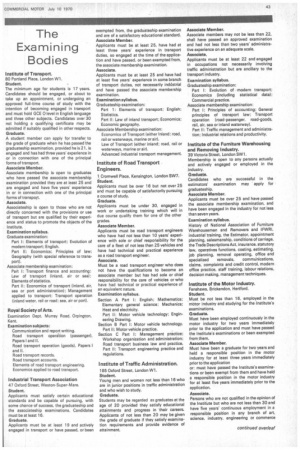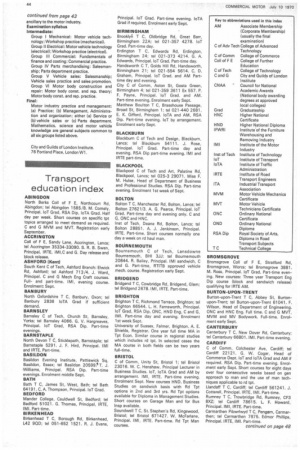The Examining Bodies
Page 45

Page 46

If you've noticed an error in this article please click here to report it so we can fix it.
Institute of Transport.
80 Portland Place, London W1.
Student.
The minimum age for students is 17 years. Candidates should be engaged, or about to take up an appointment, or undergoing an approved full-time course of study with the intention of becoming engaged in transport and must hold GCE 0 level in English language and three other subjects. Candidates over 30 not holding a qualifying certificate may be admitted if suitably qualified in other respects. Graduate.
A student member can apply for transfer to the grade of graduate when he has passed the graduateship examination, provided he is 21, is engaged and has had three years' experience in or in connection with one of the principal forms of transport.
Associate Member.
Associate membership is open to graduates who have passed the associate membership examination provided they are at least 25 and are engaged and have five years' experience in or in connection with one of the principal forms of transport.
Associate.
Associateship is open to those who are not directly concerned with the provisions or use of transport but are qualified by their experience and status to promote the objects of the Institute.
Examination syllabus.
Graduate examination: Part I: Elements of transport; Evolution of modern transport; English.
Part II: Economics; Principles of law; Geography (with special reference to transport).
Associate membership examination: Part I: Transport finance and accounting; Law of transport (inland, air or sea): Elements of statistics.
Part II: Economics of transport (inland, air, sea or port administration); Management applied to transport; Transport operation (inland water, rail or road: sea, air or port).
Royal Society of Arts.
Examination Dept. Murray Road, Orpington, Kent.
Examination subjects: Communication and report writing.
Road transport operation (passenger), Papers I and II.
Road transport operation (goods), Papers I and II.
Road transport records.
Road transport accounts.
Elements of road transport engineering.
Economics applied to road transport.
Industrial Transport Association 47 Oxford Street, Weston-Super-Mare. Student.
Applicants must satisfy certain educational standards and be capable of pursuing, with some chance ofsuccess, the graduateship and the associateship examinations. Candidates must be at least 16.
Graduate.
Applicants must be at least 19 and actively engaged in transport or have passed, or been exempted from, the graduateship examination and are of a satisfactory educational standard. Associate Member.
Applicants must be at least 25, have had at least three years' experience in transport duties, so engaged at the time of the application and have passed, or been exempted from, the associate membership examination. Associate, Applicants must be at least 25 and have had at least five years' experience in some branch of transport duties, not necessarily indastrial and have passed the associate membership examination.
Examination syllabus.
Graduateship examination: Part 1: Elements of transport; English; Statistics, Part II: Law of inland transport; Economics: Economic geography.
Associate Membership examination: Economics of Transport (either Inland: road, rail or waterways, marine or air).
Law of Transport (either inland; road, rail or waterways, ma rine or air).
Advanced industrial transport management.
Institute of Road Transport Engineers.
1. Cromwell Place, Kensington, London SW7. Student.
Applicants must be over 16 but not over 25 and must be capable of satisfactorily pursuing a course of study.
Graduate.
Applicants must be under 30, engaged in work or undertaking training which will in due course qualify them for one of the other grades.
Associate Member.
Applicants must be road transport engineers who have had not less than 10 years' experience with sole or chief responsibility for the care of a fleet of not less than 25 vehicles and have had technical and practical experience as a road transport engineer.
Associate.
Must be a road transport engineer who does not have the qualifications to become an associate member but has had sole or chief responsibility for the care of vehicles or who have had technical or practical experience of an equivalent nature.
Examination syllabus.
Section A Part I: English; Mathematics; Elementary general science; Mechanics; Heat and electricity.
Part II: Motor vehicle technology; Engineering Drawing.
Section B Part I: Motor vehicle technology. Part II: Motor vehicle practice.
Section C Part I: Management practice; Workshop organization and administration; Road transport business law and practice. Part II: Transport engineering practice and regulations.
Institute of Traffic Administration.
185 Oxford Street, London WI.
Student.
Young men and women not less than 16 who are in junior positions in traffic administration and who wish to study.
Graduate.
Students may be regarded as graduates at the age of 20 provided they satisfy educational attainments and progress in their careers. Applicants of not less than 20 may be given the grade of graduate if they satisfy examination requirements and provide evidence of attainment. Associate Member.
Associate members may not be less than 22, shall have passed an approved examination and had not less than two years' administrative experience on an adequate scale.
Associate.
Applicants must be at least 22 and engaged in occupations not necessarily involving traffic administration but are ancillary to the transport industry.
Examination syllabus.
Graduateship examination: Part I: Evolution of modern transport; Economics (including statistical data): Commercial practice.
Associate membership examination: Part I: Principles of accounting; General principles of transport law; Transport operation (road-passenger, road-goods, rail, air, sea or inland waterway).
Part II: Traffic management and administration; Industrial relations and productivity.
Institute of the Furniture Warehousing and Removing Industry.
39 Victoria Street, London SW1.
Membership is open to any persons actually and actively engaged or employed in the industry.
Graduate.
Candidates who are successful in the estimators' examination may apply for graduateship.
Associate Member.
Applicants must be over 25 and have passed the associate membership examination, and have been engaged in the industry for not less than seven years.
Examination syllabus.
History of National Association of Furniture Warehousemen and Removers and IFWR I, industrial training, the Estimator, appointment planning, salesmanship, conditions of carriage, the Trade Descriptions Act, insurance, statutory law, operatives functions, costing, estimating, job planning, removal operating, office and specialized removals, communications, claims, complaints and credit control, modern office practice, staff training, labour relations, decision making, management techniques.
Institute of the Motor Industry.
Fanshaws. Brickendon. Hertford.
Student.
Must be not less than 16, employed in the motor industry and studying for the Institute's examinations.
Graduate.
Must have been employed continuously in the motor industry for two years immediately prior to the application and must have passed the Institute's examinations or been exempted from them.
Associate Member.
Must have been a graduate for two years and held a responsible position in the motor industry for at least three years immediately prior to the application or: must have passed the Institute's examinations or been exempt from them and have held a responsible position in the motor industry for at least five years immediately prior to the application.
Associate.
Persons who are not qualified in the opinion of the Institute but who are not less than 30 and have five years' continuous employment in a responsible position in any branch of art, science, industry, engineering or commerce continued from page 43 ancillary to the motor industry.
Examination syllabus Intermediate: Group I Mechanical: Motor vehicle technology; Workshop practice {mechanical). Group II Electrical: Motor vehicle technology (electrical); Workshop practice (electrical). Group III Commercial: Fundamentals of finance and costing; Commercial practice. Group IV Parts merchandising: Salesmanship; Parts department practice.
Group V Vehicle sales: Salesmanship; Vehicle sales practice and sales promotion. Group VI Motor body construction and repair; Motor body const. and rep. theory: Motor body const. and rep. practice.
Final: Motor industry practice and management: (a) Practice; (b) Management, Administration and organization: either (a) Service or (b) vehicle sales or (c) Parts department. Mathematics, science and motor vehicle knowledge are general subjects common to all six groups listed above.
City and Guilds of London Institute. 76 Portland Place, London Wl.












































































































